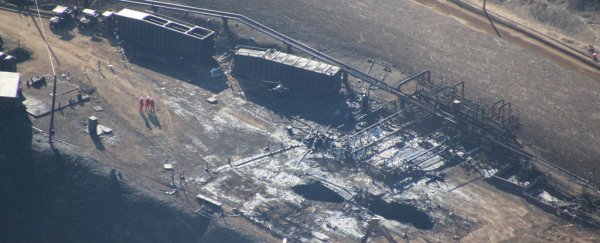A catastrophic gas leak in California that has continued unabated for more than two months has been declared a state of emergency by Governor Jerry Brown.
The leak at Aliso Canyon in a well owned by the Southern California Gas Company (SoCalGas) began spewing methane gas into the atmosphere in late October 2015, and the prolonged duration of the hazard has prompted the state to step up oversight of what is now considered an unprecedented environmental disaster.
Under the proclamation of emergency, the government is setting up a new local command structure to help coordinate efforts to contain the leak, and will expand its monitoring of local air quality. SoCalGas – which will have to cover costs related to the problem – has also been ordered to identify a backup plan if relief wells fail to seal the leak (or if the situation worsens).
The relief wells are expected to take up to four months to build, although there's no guarantee yet they'll contain the gas.
The emergency status comes in response to ongoing calls for action by the local Porter Ranch community, who have complained for months about the effects of the leak, including experiencing headaches, nausea, and nosebleeds.
Two local schools have been closed and thousands of families have been relocated at the expense of SoCalGas, which maintains that the gas, while unpleasant in odour, is not dangerous to residents. However, others dispute this claim, with health officials acknowledging prolonged exposure to trace chemicals – some of which are known to be carcinogenic – could be hazardous to health, which is why the government is stepping up air monitoring at the site.
In addition to health concerns, the ultimate environmental impact of the disaster cannot yet be calculated, but already it's considered a significant catastrophe. At its peak in late November, the leak rate was measured at 58,000 kilograms of gas per hour, although it dropped into the 30,000s in December. Over the course of a month, the peak rate has been compared to the equivalent of putting 200,000 extra cars on the road for a year.
"It's wholly unacceptable to have a pollution source of this magnitude going for upwards of six months, which is what the projections are," Tim O'Connor, director of California Oil and Gas at the Environmental Defence Fund, told Merrit Kennedy at NPR in December. "When you're thinking about 50,000 kilograms per hour and the climate impact of that, it's like running all of the refineries in California side-by-side."
"It's like the BP spill on land," famed environmental activist Erin Brockovich told Susan Abram at the Los Angeles Daily News. "I've really never seen anything like this. I think the magnitude is enormous. It's like a volcano, and the gas is like the lava that can't be shut off."
